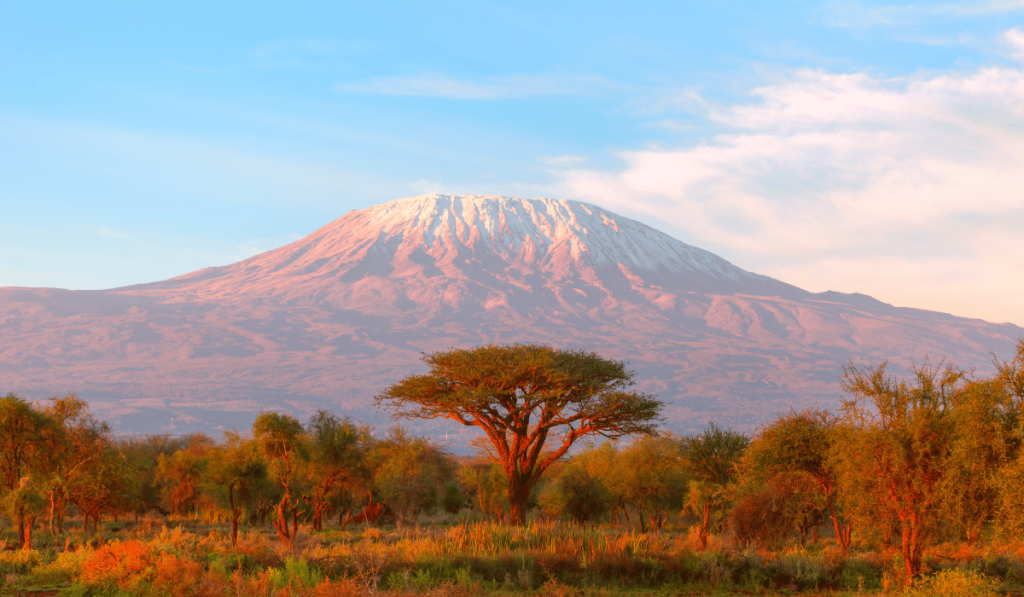7 Days Kilimanjaro Rongai Route
This is one of Kilimanjaro’s easiest routes, and it has become an increasingly popular route in recent years. This route is located on the northern side of Mount Kilimanjaro with a variety of spectacular landscapes together with different plants and animals species. The typical duration for this trip is 6 days. However, you can also add an acclimatization day and make it 7 days
The Rongai Route is more scenic than the Marangu Route and easier than other camping route in climbing Kilimanjaro and the success rate on the Rongai Route is very high. Unlike the Marangu Route where you sleep in huts, on the Rongai Route you sleep in tents, the porter will have your tent pitched and waiting for you at the end of each days trek. This route starts on the north side of the mountain just south of the Kenyan border and is one of the least traveled routes. The route merges with the Marangu Route for the summit climb. The descend follows the Marangu Route on the mountain’s southeast side, so you will able see Kilimanjaro from many view points. There are two versions of this trek – a direct 6-day itinerary, and a 7-day itinerary that takes a longer route. The 6-day itinerary is described down below and the longer variation is described in the extra day’s section.
Day 1: Arusha to Rongai Gate to Simba Camp
Elevation(m): 1,387/915 m to 1,950 m to 2,750 m
Distance: 9 km
Hiking Time: 4 hours
Habitat: Montane Forest
You will have an early breakfast. Transfer by our vehicles through many villages and coffee and plantations for 2-3 hour drive to Rongai Gate (1,950 m/6,398 ft). After signing in and preparing the porters, you will start hiking on a wide path winding through fields of maize and potatoes, and then enter into montane forest. You will then start to climb gently but consistently through attractive forest that shelters a variety of wildlife. The forest begins to thin as you arrive at Simba Camp (2,600 m/8,530ft) with fantastic views over the Kenyan plains.
Day 2: Simba Camp to Kikelewa Camp
Elevation: 2,750 m to 3,600 m
Distance: 17 km
Hiking Time: 7 hours
Habitat: Moorland
After an early breakfast you will have a steady ascent to the second cave where you will stop for lunch. You leave the direct trail at this point and strike out across the moorland on a smaller path toward Mawenzi side peak.to Kikelewa Camp in a sheltered valley. At the Kikelewa Camp you will settle for your dinner and overnight rest.
Day 3: Kikelewa camp to Mawenzi turn hut
Elevation: 3,600m to 4,330m
Distance: 7km
Hiking Time: 4 hours
Habitat: Semi-Desert
After breakfast you will face a short, steep climb up grassy slopes; rewarded by superb all-round views, immersed in the vast surrounding wilderness. Soon after, you leave the vegetation behind and arrive at the Mawenzi Tarn Camp, which is situated in a spectacular cirque directly beneath the towering spires of Mawenzi Peak. After this hike, you will reach to the Mawenzi turn hut camp where you will also see the amazing undried Lake with no inlet as well as outlet here you will have lunch and rest then dinner and overnight at this camp.
Day 4: Acclimatization day (6 day itinerary skips this day)
This is your extra day on the mountain, and you will spend two nights at Mawenzi Tarn. You will hike up towards Mawenzi for a splendid acclimatization hike. Then after return back to the camp for lunch the dinner and overnight.
Day 5: Mawenzi Tarn hut to Kibo Huts camp
Elevation: 4,330 m to 4,695 m
Distance: 8km
Hiking Time: 5 hours
Habitat: Alpine Desert
After an early breakfast you will cross the lunar desert of the saddle between Kibo peak and Mawenzi peak to Kibo Huts at the bottom of Kibo’s crater wall. You should spend the remainder of the day resting and preparing for your summit climb.
Day 6: Summit Day! Kibo Huts camp to Uhuru Peak to Horombo Huts camp
Elevation: 4,695 m to 5,895 m to 3,690 m
Distance: 4 km up, 14 km down
Hiking Time: 10-15 hours
Habitat: Alpine Desert.
Wake at midnight to a light breakfast and then prepare for your summit ascent. The goal is to climb before dawn so that you can reach Uhuru Peak shortly before or after sunrise. Leave to the peak at 12; 00AM, switchback up steep scree or possibly snow, and reach Gilman’s Point on the crater rim at 5,861 m/18,640 ft between 4 and 6 AM. At this point, you will have views of the fabled crater and its icecaps facing you. Then after 2 hours of hiking along the Kibo crater rim near the celebrated snows takes you to Kilimanjaro’s true summit, Uhuru Peak here you will spend some times for taking photo’s but it will depend on how you feel. After your summit activities done, descend back to the Kibo Huts, have lunch, rest, collect your equipment, and continue on down, re-crossing the saddle to the Horombo Huts. Have dinner and overnight at Horombo camp.
Day 7: Horombo Huts camp to Marangu Gate to Arusha.
Elevation: 3,690 m to 1,830 m to 1,387 m
Distance: 18 km
Hiking Time: 5-7 hours
After a long and enjoyable sleep you will be awaken for breakfast and pack up, start descend through the moorland to Mandara Huts. Here you will have lunch then proceed with your triumphant recessional down through lush forest to Marangu Gate. Here you will sign out then after a vehicle will take you to back to the hotel where it is definitely time for certificate presentation and celebration!
Price per person for the Whole Trips Minimum 1 people to Maximum group 40 people.
Our Package include:
Fair and ethical treatment of porters.
All Park entrance fee.
Rescue fees in mountain
Transfers from Airport and return. good
All meals while on the Mountain
Salaries to the guides, cooks and porters
Highly experienced English speaking – Professional & experienced mountain guides
Government Tax.
Hot water for washing every day
Clean, purified drinking water
Management and safety procedures
Fair and ethical treatment of porters
Water proof Tents .
Established in 2016 and fully registered with the Tanzania BRELA No: 137759659
Climb And Trek
Talk To Us
- +255 676 668 468
- +255742806279
- info@manyaratravel.com
- manyaratravelclub7@gmail.com
- Arusha, Tanzania, East Africa
Copyright © 2024 Manyara Travel Club and Climbing

